Applied Computer Science
Do you already have an academic Bachelor’s or Master’s degree in Engineering or Applied Sciences and do you want to pursue your career in the field of Computer Science and Data Science? Then the Master’s in Applied Computer Sciences is the programme you’re looking for! It is organised to accommodate your scientific background and future-oriented academic interests – developing the necessary Computer Science and Data Science skills by complementing your primary field of expertise. Above all that, we offer a wide variety of highly specialised elective courses.

“Data science and big data analytics: key areas to develop”
Data Science and Engineering
Data has become a torrent, flowing into every aspect of the international economy, and is an invaluable capital for a plethora of global operations. Google, Yahoo and Microsoft have access to zettabytes or brontobytes of data, and social media platforms connect hundreds of millions of users around the globe. Moreover, millions of networked sensors and actuators are being embedded in the physical world in devices such as mobile phones, smart energy meters and distributed cameras. What is more, petabytes of diverse data, ranging from genomic data to health records and medical imaging are transforming healthcare.
The Master in Applied Computer Science provides a broad education in data science and engineering with focus on generic smart systems design, complemented with elective minors in digital health, smart cities, environmental informatics, and business intelligence. The accumulated knowledge will give rise to an ICT engineer, capable to design systems of systems and apply analytics on the heterogeneous data obtained by such systems.
Why Study at VUB?
VUB offers high-quality, English-taught programmes supported by outstanding research. Being a student at VUB means learning in an open atmosphere of tolerance and diversity, and growing into an independent and critical thinking individual. There is an excellent student to staff ratio, making it possible to teach in small groups and enabling close interaction between students and the academic staff. In addition, the university is located in three student-friendly green campusses in the cosmopolitan city of Brussels.
Read more: https://www.vub.be/en/
Why Study in Brussels?
When moving about in Brussels, you hear a lot of different languages. That’s no coincidence, because the city is a melting pot of cultures. With 30% of the population of foreign origin, you can expect a rich cultural climate. Brussels is home to the EU Institutions and several af liates, NATO HQ, diplomatic representation of ces, headquarters for many international companies, NGOs, trade associations, one of the world’s largest press corps, as well as a whole host of international and European schools.
Want to know more about studying at the Faculty of Engineering?
Join our online info sessions for international studentsAny questions?
Don’t hesitate to write us an email. We’d be happy to help you on your way!
Contact us
Educational Quality
Here at VUB we put great care and effort in the quality of our education. Transparency is key. Information on the educational quality of each programme is public, e.g. describing its strengths and actions.
Public info on the quality of the programme
The Programme at a Glance
The first year of the programme focuses on developing fundamental computer science skills. Elective courses in the second year allow the student to specialize in domains, such as big data analytics, artificial intelligence, bioinformatics, machine learning, internet-of-things systems, biomedical engineering, embedded software, or remote sensing, as well as many other possibilities. Practical sessions, a master thesis and, optionally, an internship are also included in the study programme.
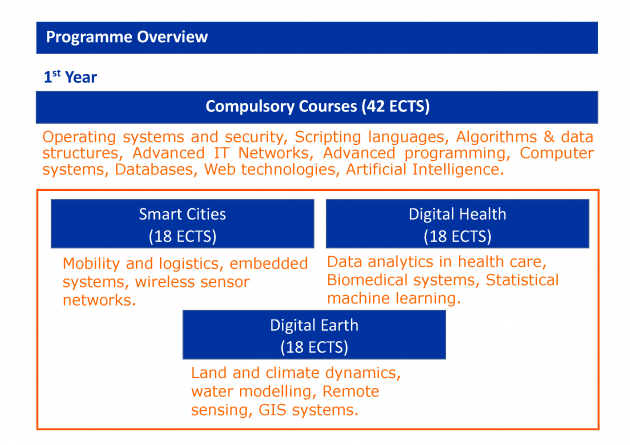
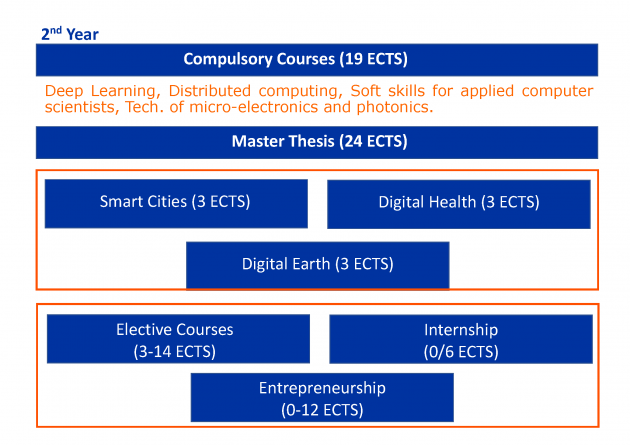
Credits
ECTS (European Credit Transfer System): 1 credit represents 25-30 hours of study activity
Smart Cities
The Smart Cities module looks at logistics and mobility, with a focus on finding sustainable solutions for environmental problems. It makes use of modern software and systems engineering technology as well as new techniques for embedded systems. The ‘internet of things’ is also considered: how cryptography, configuration and sensors, among others, function in networks. A versatile look at the science behind high-tech applications.
Digital Health
Combining several disciplines, the Digital Health module approaches biological problems such as protein structure from a computational angle. Digital imaging, machine learning and medical informatics are also important in this module. A multidisciplinary approach to health, biology and the medical field.
Digital Earth
The module “digital earth” offers a specialization on aspects of information processing, remote sensing, analysis models and systems to address sustainable environment problems, including climate change, and water resources management.
Business Intelligence
You will learn technologies and practices for the integration and analysis of business data that support business decision making. The module Business Intelligence is offered through a double degree with the Technical University of Cluj-Napoca (TUCN) in Romania; specifically, the Master in Computer and Information Technology, specialization “Complements in Computer Science” at TUCN. The Business Intelligence specialization is available only to students following this double degree and is awarded by TUCN. For more information about this specialization, please contact the MACS administration.
Note that VUB students, following one of the other three specializations above (Smart Cities, Digital Health, Digital Earth), have the opportunity to select up to 12 ECTS of a module on entrepreneurship, which provides specialised knowledge on the interaction between computer science and business intelligence.
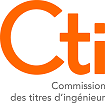
Learning outcomes
Learning outcomes describe the intended knowledge and understanding, skills and attitudes that you must master after completing your studies. Do you want to know more about the specific learning outcomes of this programme? Click here for more information.
Internships
Students can opt to take up an internship (of 6 ECTS – 40 working days), which will preferably take place during the summer (July-August) to avoid delaying study progress. Registration for the internship is possible, provided that the student does not have a combined bachelor-master enrolment and has already attained 40 ECTS of the master's programme (exemptions included).
If you want to register for an internship, read here the procedure for Applied Computer Science Engineering.
The necessary steps are as follows:
- First, make sure that you fulfill the criteria; namely, you do not have a combined bachelor-master enrolment and have already attained 40 ECTS of the master's programme (exemptions included)
- Second, select a company and an academic supervisor from the VUB and get in touch with them. If you are looking for a company: The programme has partnerships with various companies and organisations, including APEX R&D, TenForce, NUMECA International and Digipolis [see this link for a detailed list of partner companies]. You can alternatively look at the VUB dedicated webpage (see this link for available internship openings.
- Third, provided you have a positive response by both company and supervisor, then fill in the online form available here
The academic coordinator for the internships in the MACS programme is Prof. Adrian Munteanu.
For further administrative support, students should contact the MACS programme administration at macs@etrovub.be
Master Thesis
The master thesis topic is most often situated in the scientific fields of the research groups within the department of Electronics and Informatics (ETRO) and the department of Computer Science (DINF), although collaborations with other research groups are possible. The research groups provide an online list of potential topics (associated to promotors).
Thesis topics:
- Department of Computer Science (DINF):
https://dinf.vub.ac.be/thesis/ (requires VUB login) - Department of Electronics and Informatics (ETRO):
http://www.etrovub.be/EDUCATION/Thesis_Proposals/
The student is fully responsible for the master thesis project, of course under close guidance of the academic staff. There are various important facets to be addressed: a thorough examination of the scientific context of the research problem, a positioning of the problem versus the current state of the art, a clear formulation of the scope and the aim of the project, the setup and follow-up of a planning, the execution of the scientific program, and the preparation of a manuscript describing the project’s output. Finally, the thesis needs to be presented in front of a jury, consisting of the promotor, other professors and potentially external members.
The evaluation form that the committee completes to determine the grade of the master thesis is provided here.
The template front page of the Master Thesis for MACS is provided here.
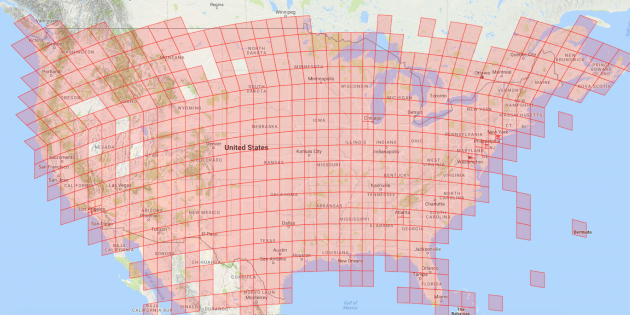
Some Previous Thesis Topics
Twitter User Geolocation Using Deep Learning
Predicting the geographical location of users on social networks like Twitter is an active research topic with plenty of methods proposed so far. Most of the existing work follows either a content-based or a network-based approach. The former is based on user-generated content while the latter exploits the structure of the network of users. In this thesis, we proposed a more generic approach, which incorporates not only both content-based and network-based features, but also other available information into a unified model. Our approach, named Multi-Entry Neural Network (MENET), leveraged the latest advances in deep learning and multiview learning. A realization of MENET with textual, network and metadata features results in an effective method for Twitter user geolocation, achieving the state of the art on two well-known datasets.
- Student: Tien Do Huu. Promotor: Prof. Dr. Nikos Deligiannis
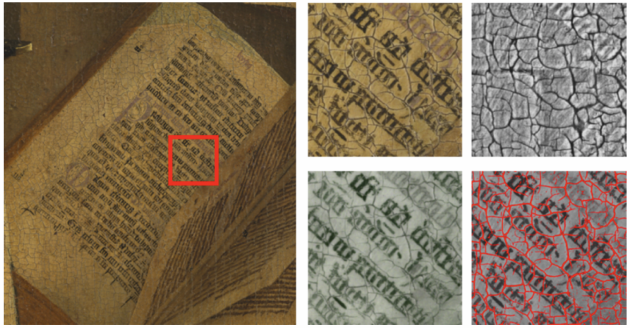
Image Processing for Art Investigation
Museums started digitizing their collections, mainly for preservation, documentation and dissemination purposes, but one can go further than archival: digital acquisition enables digital analysis of paintings. This proves to be a useful, noninvasive tool, for many applications such as restoration, conservation, art history, material and structure characterization, authentication, dating and even style analysis. Paintings are complex structures. Analysis of all pictorial layers and the support requires multimodal imaging, high resolution and standardized data acquisition, and big heterogeneous data analytics tools and expertise. We have a high resolution multimodal dataset of famous paintings at our disposal that can be used in various art related studies.
- Student: Jasper Bervernage. Promotor: Dr. Bruno Cornelis
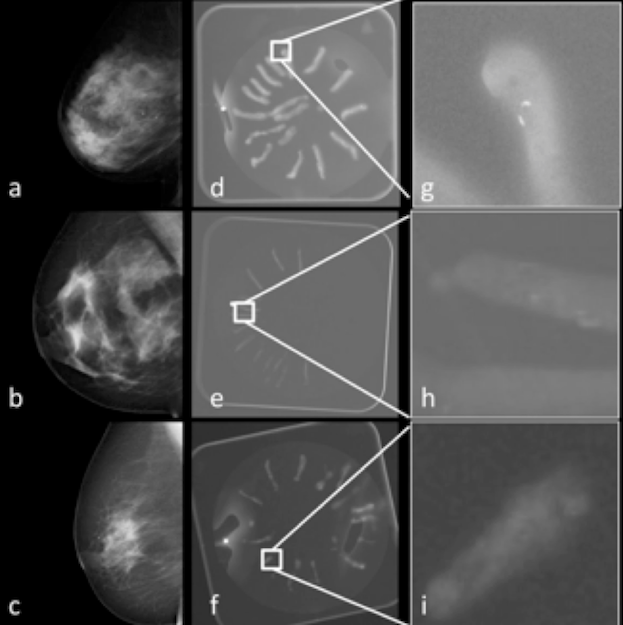
Automatic Detection of Suspicious Microcalcifications in High-Resolution 3D micro-CT breast Imaging
The aim of this master thesis was to optimize an automated predictive model for breast cancer detection based on the characteristics of tiny spots of calcium, called “micro-calcifications”. Therefore, 50 benign and 50 malignant samples were scanned using an in vitro 3D high-resolution micro-CT scan. In total a set of 3685 microcalcifications were extracted. To distinguish benign and malignant microcalcifications, a set of features is calculated. A set of 48 novel 3D texture features is proposed to characterize interior differences. The samples can be classified correctly with an accuracy of 87, 88%, a sensitivity of 98,01% and a specificity of 78,72%. This is an improvement of the accuracy with 15,18% in comparison with previous research.
- Student: Inez Van Laer. Promotor: Prof. Dr. Bart Jansen
Three Research Departments
There are three research departments active in the Master of Applied Computer Science.
Industrial Partners
The three departments have various contacts in the industry, ranging over multiple research domains.
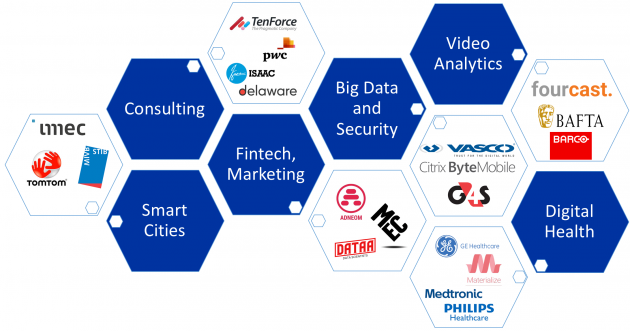
Academic Partners
Research collaborations are established with leading universities in the world (Duke University, University College London, University of Patras, Northwestern Polytechnical University and EPFL) in the form of international joint research groups. The module Business Intelligence is offered through a double degree with the Technical University of Cluj-Napoca in Romania.
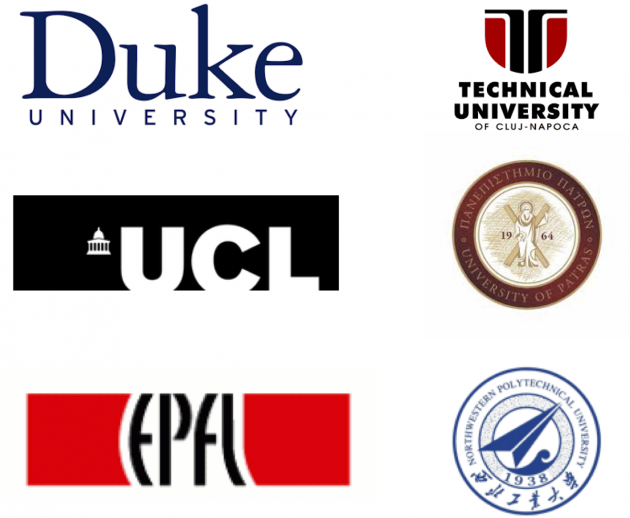
Specific admission criteria
This programme is intended for students with an academic Bachelor’s or Master’s degree degree in a field of Engineering or Applied Sciences and want to pursue a career in the field of Computer Science. Admission is based on acceptance and will be evaluated on a case-by-case basis.
Language requirements
Prospective students can provide proof of sufficient knowledge of English as language of instruction by meeting one of the following criteria. Please find here an overview of the criteria.
Start Your Application
FOR THE ENGLISH VERSION OF THE PROGRAMME: SELECT CODE 00243
Here is the link where you can start your application:
Please consult the description of the steps for applying to the Master in Applied Computer Science.
For more details on admission requirements and application
Click hereAFTER GRADUATION
A master degree opens doors in many different branches and sectors. The graduates of the Master in Applied Computer Science programme can undertake different positions, including research engineers, software developers, system architects, IoT engineers, data scientists and data engineers, business developers and consultants, in the private sector or in (non-) governmental organisations, or continue their academic career as a PhD researchers, or found companies.
Are you interested in keeping contact? Then join our group of Alumni on LinkedIn: www.linkedin.com/groups/12164282/
Not sure what your next step should be? The VUB helps you with your first steps on the job market.
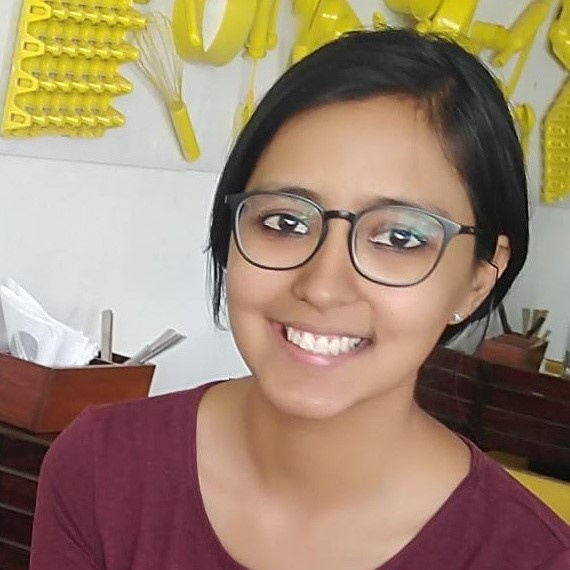
Student Testimonials
"Being a student during these tough times is an experience that I could never really have imagined. Thanks to all the professors at VUB for their constant support and guidance for making my first semester memorable. Even though I haven't yet arrived in Brussels, I still do feel a part of the VUB."
Tripat Kaur, International MACS student, 2020 -2021
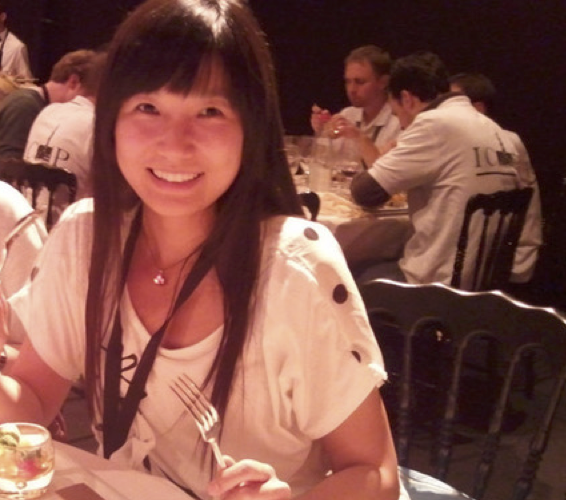
"This programme does not only help students to gain a solid knowledge of Computer Science technologies, but also provides numerous practical sessions to gain hands-on experience."
- Ting Ting Liu, Tom Tom
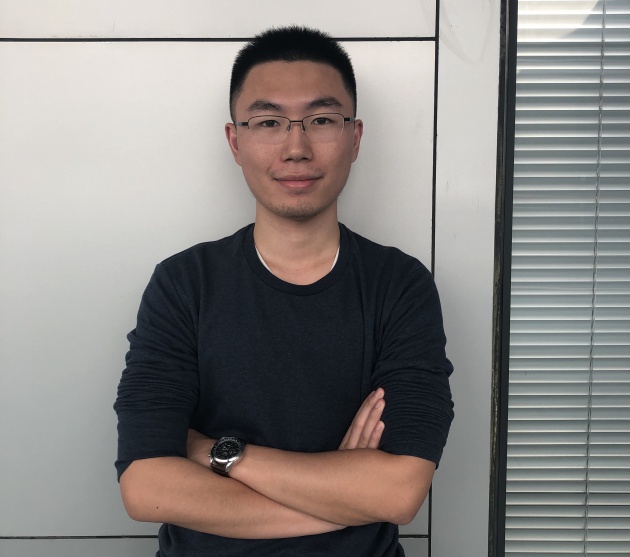
"I highly recommend the master in Applied Computer Science programme to any Bachelor student who is interested in computer science and would like to embrace the upcoming age of AI and big data. You will be exposed to cutting edge knowledge and skills in computer science including AI, big data analytics, human-computer interaction etc. I had an unforgettable study experience at VUB thanks to the always helpful VUB staff, the knowledgeable professors, the patient TAs and and the adorable classmates from every corner of the world."
- Xiao Luo, China Railway Rolling Stock Corporation ZhuZhou institute Co.ltd, China
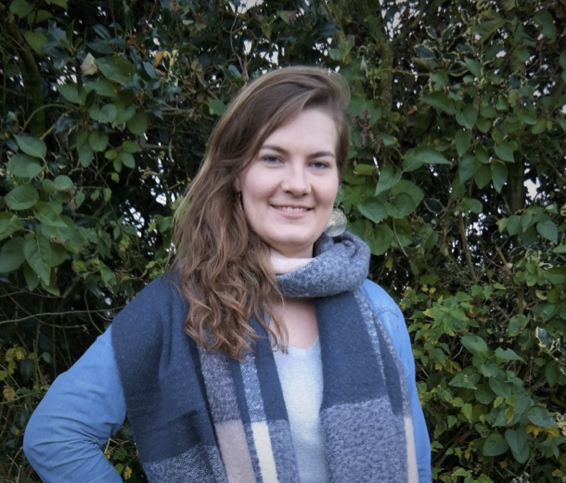
"The unique strength of this program is the combination of computer science knowledge and the personal scientific area of expertise. I am genuinely grateful to the VUB professors who made this all possible. They gave me passion and nothing is more important than that."
- Inez Van Laer, Delaware
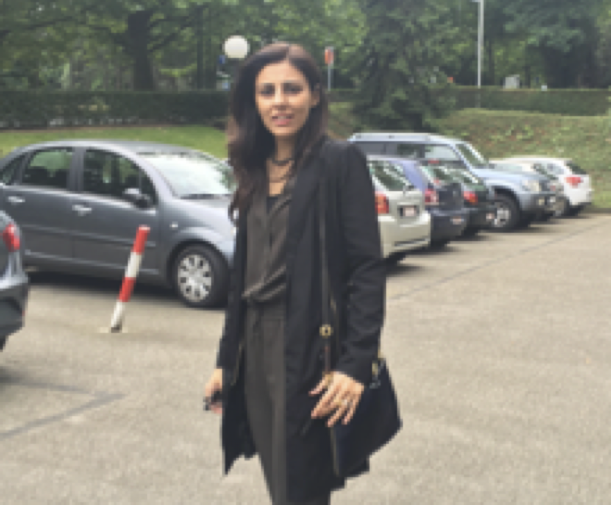
"I highly recommend this program to anyone with an academic bachelor’s degree in another scientific field who wants to pursue his/her academic career in the field of Computer Science."
- Saba Faraz, Altran
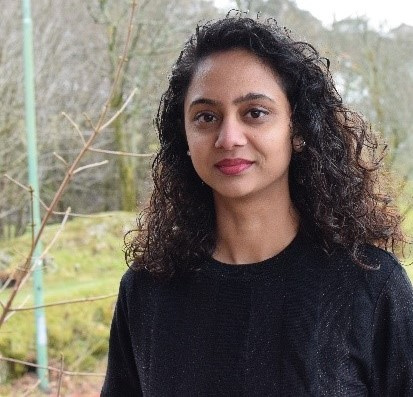
As a student in the Master programme of Applied Computer Science at VUB, I have gained knowledge, confidence and practical skills that help me in my work. The courses in this programme were great assets and the instructors of the courses were highly skilled, patient and understanding. I highly recommend this programme to any degree holder who is willing to enter the world of big data. It was a wonderful opportunity to be in an international classroom, learn about different cultures and work in a team. I am very grateful to VUB, my professors, TAs, and my classmates from all over the world.
- Vidya Sathia Moorthy, Data Engineer, Tryg, Norway
Career Center
The VUB helps you to make your first step in the job market with workshops, networking events, job fairs, tips ‘n tricks for job interviews. All an ambitious student needs!
First step in the market
Interested in a PhD?
If you want to continue your academic career, you can apply for a PhD position at the Vrije Universiteit Brussel. All you need is a promoter, research subject and sufficient funding. Are you up for this challenge?
More info
Want to know more about our alumni?
More infoFollow the VUB
On LinkedInApplication deadline
Prospective students are advised to apply as soon as possible, even if they have not yet obtained their degree. Applications can only be submitted through our website .
There are two separate general deadlines depending on your nationality:
- Non-EEA citizens: before the 1st of April.
- EEA-citizens: before the 1st of September
See here for further information and for information on exceptions to these general deadlines.
For more details on admission requirements and application
Click hereWant to know more about next academic year?
Check out the latest updatesTuition fees
All Flemish universities in Belgium are subsidised by the government, which results in relatively low tuition fees.
The tuition fee consists of a fixed amount paid every year you register in the programme and a variable amount paid for each ECTS you register:
- The fixed yearly amount is the same for both EEA and non-EEA students, and it is 245,20 Euro.
- The variable amount is 11,7 Euro/ECTS for EEA students or 50 Euro/ECTS for non-EEA students.
Example tuition fee calculation:
- If you register per year and you successfully obtain 60 ECTS, then the tuition fee per year is described below:
For Non-EEA students: 245,20 Euro/year + 50 Euro/credit x 60 credits = 3245,20 Euro (per academic year)
For EEA students: 245,20 Euro + 11,7 Euro/credit x 60 credits = 947,20 Euro (per academic year)
- The total amount that you need to pay if you finish the programme in two years is:
For Non-EEA students: 6490,4 Euro
For EEA students: 1894,4 Euro
A detailed overview of the tuition fees as well as examples can be found on: www.vub.be/en/tuition-fees
About the Programme
- FAQ
- Academic calendar
https://www.vub.be/sites/vub/files/academic-calendar-2018-2019_en.pdf - Exam schedule
https://student.vub.be/en/ir#exams
Scholarship Programmes
Priority Country Programme
Aimed at promoting exchanges of students between Belgium/Flanders and the following priority countries: Brazil, Chile, Japan, Mexico, Morocco, Russia, South Africa, Turkey and the United States of America.
http://www.studyinflanders.be/en/scholarship-programmes/priority-country-programme/
ASEM-DUO
Aims at promoting exchange of students between Belgium/Flanders and 4 countries in Asia, i.e. China, India, South Korea and Vietnam.
http://www.studyinflanders.be/en/scholarship-programmes/asem-duo/
Master Mind Scholarships
The Government of Flanders awards scholarships to outstanding students for Master programmes in Flanders and Brussels.
https://www.studyinflanders.be/scholarships/master-mind-scholarships
Interesting Links
General Information
- Study Guidance
https://my.vub.be/en/study-guidance - Language Class
http://www.cvo-bec.net/en/index_en.html - Health and well-being
https://my.vub.be/en/health-wellbeing - Sports at the VUB
https://www.vub.be/en/sport - About Belgium
https://student.vub.be/en/heart-of-europe#belgium - About Cti
https://www.cti-commission.fr/
Social Life
- Meet locals and expats
https://www.meetup.com/ - Student organisations
https://student.vub.be/en/student-organisations#find-your-student-organisation
About Brussels
- How to get around
https://www.vub.be/en/practical/public-transport - Things to do in Brussels
https://student.vub.be/en/leisure#brussel
https://student.vub.be/en/leisure#calendar